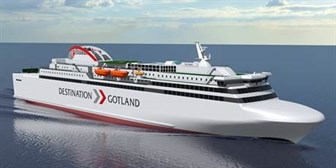Bestobell Marine to supply LNG fuel system valves to Gotland vessel
Parker Bestobell Marine, a leading global upplier of cryogenic globe and check valves for ships, has secured a second order to supply its globe and check valves that will be used in the LNG fuel gas system on the second ferry being built for Swedish owner Rederi AB Gotland.
 This contract follows Parker Bestobell Marine securing the order to supply valves to the first Gotland Ferry earlier this year. When completed, the ferries will sail between the Swedish mainland and the island of Gotland.
This contract follows Parker Bestobell Marine securing the order to supply valves to the first Gotland Ferry earlier this year. When completed, the ferries will sail between the Swedish mainland and the island of Gotland.
By using LNG as its primary fuel source, the ferries will make significant reductions in their emissions of NOx, SOx, CO2 and particulates, allowing them to comply with the latest IMO Tier III regulations.
“China is where we are focusing a lot of effort with our local partner Healthlead, to ensure we are seen as the number one supplier for marine grade cryogenic globe valves, both for LNGC cargo valves and LNG fuel system valves," said Duncan Gaskin, sales director for Parker Bestobell Marine.
Parker Bestobell Marine says it is committed to promoting the use of LNG as a marine fuel because of its “clean burn” properties that can help reduce the amount of harmful emissions and carbon dioxide a ships engine produces.
“Our proven leak-free design of over 10 years, with true fire-safe properties provides end users with the reassurance they need when purchasing cryogenic valves," Gaskin said. "We estimate there are over 35,000 Bestobell Marine cryogenic globe valves already fitted on ships, which is an amazing record to have and again provides reassurance to end users of the quality of our products.”
Parker Bestobell Marine is a world leader in the manufacture of LNG cryogenic valves, with over 50 years’ experience. Bestobell’s valves are widely used on LNG carriers, FSRUs (floating, storage and re-gasification units) and LNG fuel gas systems.
The company designs and produces valves to meet specific requirements in the marine sector and has supplied cryogenic valves to a majority of the major shipyards building LNG carriers.

- Freeport LNG export plant in Texas reports shutdown of liquefaction train
- TotalEnergies and Mozambique announce the full restart of the $20-B Mozambique LNG project
- RWE strengthens partnerships with ADNOC and Masdar to enhance energy security in Germany and Europe
- Five energy market trends to track in 2026, the year of the glut
- Venture Global wins LNG arbitration case brought by Spain's Repsol



Comments